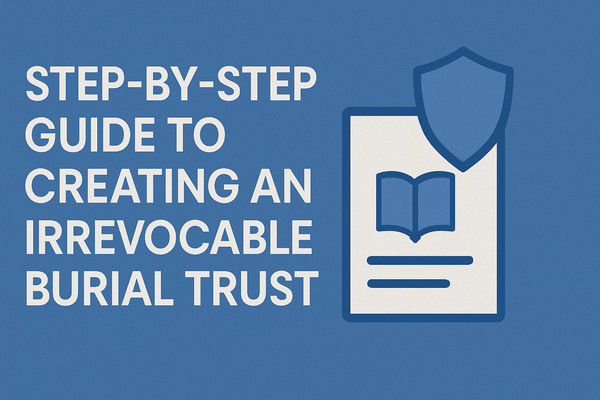Notifications
ALL BUSINESS
COMIDA
DIRECTORIES
ENTERTAINMENT
FINER THINGS
HEALTH
MARKETPLACE
MEMBER's ONLY
MONEY MATTER$
MOTIVATIONAL
NEWS & WEATHER
TECHNOLOGIA
TV NETWORKS
VIDEOS
VOTE USA 2026/2028
INVESTOR RELATIONS
COMING 2026 / 2027
ALL BUSINESS
COMIDA
DIRECTORIES
ENTERTAINMENT
FINER THINGS
HEALTH
MARKETPLACE
MEMBER's ONLY
MONEY MATTER$
MOTIVATIONAL
NEWS & WEATHER
TECHNOLOGIA
TV NETWORKS
VIDEOS
VOTE USA 2026/2028
INVESTOR RELATIONS
COMING 2026 / 2027
 Burial Senior Insurance -
May 1 -
Business -
irrevocable burial trust
-
199 views -
0 Comments -
0 Likes -
0 Reviews
Burial Senior Insurance -
May 1 -
Business -
irrevocable burial trust
-
199 views -
0 Comments -
0 Likes -
0 Reviews

Planning for the future often means making difficult but necessary decisions about end-of-life expenses. One of the smartest ways to protect your loved ones and secure eligibility for Medicaid is by setting up an irrevocable burial trust. These trusts allow you to prepay for funeral expenses while ensuring the funds are exempt from Medicaid’s asset calculations.
In this step-by-step guide, we’ll explain what irrevocable burial trusts are, how they work, and the exact steps to create one that aligns with both your personal wishes and state-specific Medicaid rules.
An irrevocable burial trust (IBT) is a legal financial arrangement in which money is set aside to cover your funeral and burial expenses. Once funds are placed in the trust, they cannot be withdrawn or used for anything other than their intended purpose. This makes the trust irrevocable, meaning it cannot be changed or canceled after it is established.
These trusts are commonly funded by prepaid funeral insurance or lump-sum deposits and are often created in coordination with a funeral home or licensed trust provider.
There are several important reasons why individuals choose to create an irrevocable burial trust:
Medicaid Asset Protection: Funds in an irrevocable burial trust are not counted toward Medicaid eligibility limits.
Guaranteed Funeral Coverage: Your final expenses are covered, reducing the burden on your family.
Exemption from the Look-Back Period: Medicaid does not penalize transfers to a properly structured burial trust.
State-Specific Compliance: These trusts are recognized across states and are often required to meet certain guidelines for asset exemption.
Let’s walk through the key steps to creating an irrevocable burial trust that is both effective and Medicaid-compliant.
Start by estimating how much you’ll need for funeral and burial costs. Consider:
Casket or urn
Embalming or cremation
Funeral services
Cemetery plot or niche
Headstone or marker
Obituary and death certificates
Clergy, flowers, and transportation
The average funeral costs range from $8,000 to $12,000, depending on your preferences and location.
Each state has different rules regarding Medicaid and irrevocable burial trusts. Before proceeding, speak with a Medicaid planning expert or an elder law attorney. They’ll help you:
Understand local regulations
Determine how much money you can place in the trust
Ensure all documentation is in order
This step is crucial to avoid disqualification or penalties during the Medicaid application process.
You can set up the trust directly with a funeral home or through an insurance company offering Medicaid-compliant funeral policies. Look for providers that:
Specialize in irrevocable burial trusts
Offer state-approved trust documentation
Allow for itemized services and merchandise
Some national funeral planning services work with licensed trustees to manage these trusts on your behalf.
Once you choose a provider, it’s time to:
Itemize your funeral plan: List services and items to be included.
Designate a trustee: Usually a funeral home or trust administrator.
Fund the trust: Transfer funds from a bank account or purchase a prepaid funeral insurance policy that names the trust as the owner/beneficiary.
Many states allow funding amounts between $10,000 and $15,000, but this varies.
Ensure the trust meets the following Medicaid requirements:
It must be irrevocable—cannot be canceled or altered.
Funds must be used exclusively for burial and funeral expenses.
In some states, Medicaid must be named as the residual beneficiary, meaning any leftover funds after your funeral go to the state to reimburse Medicaid.
Be sure to obtain written confirmation of the trust's irrevocable status.
When you apply for Medicaid, you’ll need to provide:
A copy of the irrevocable trust agreement
Funeral plan itemization
Proof of funding (such as policy documents or receipts)
Letters from the trust provider or funeral home
Proper documentation is essential to ensure that the funds are excluded from Medicaid asset calculations.
Although the trust itself is irrevocable, you should still review your funeral arrangements periodically to ensure they reflect your current wishes. Some providers allow you to update funeral preferences even if the trust cannot be altered.
Protect Medicaid Eligibility: Legally spend down excess assets without penalty.
Eliminate Family Burden: Relieve loved ones from financial and planning stress.
Maintain Dignity: Preplan a respectful farewell according to your preferences.
Quick and Simple Setup: Usually completed within a few days with proper guidance.
Funding more than your state’s allowable limit
Naming an ineligible trustee
Failing to itemize services
Not including the state as a residual beneficiary if required
Mixing burial funds with other non-approved expenses
Working with a qualified planner will help avoid these issues.
Creating an irrevocable burial trust is one of the smartest ways to plan for the inevitable while protecting your assets and Medicaid eligibility. It ensures your funeral costs are covered without burdening your family and shields your funds from being counted as part of your estate. By following this step-by-step guide, you can create a trust that aligns with both your end-of-life wishes and Medicaid rules.
As Medicaid planning becomes increasingly important in 2025 and beyond, taking the time to establish an irrevocable burial trust offers both financial and emotional peace of mind.
Yes, you can establish an irrevocable burial trust for a spouse, parent, or dependent, but make sure it meets state Medicaid requirements for that individual.
If any funds remain after all funeral costs are covered, the excess may be returned to the estate or, in some states, to Medicaid as reimbursement.
Yes, most states cap the amount you can place in an irrevocable burial trust—typically between $10,000 and $15,000. Always check your state’s specific guidelines.
